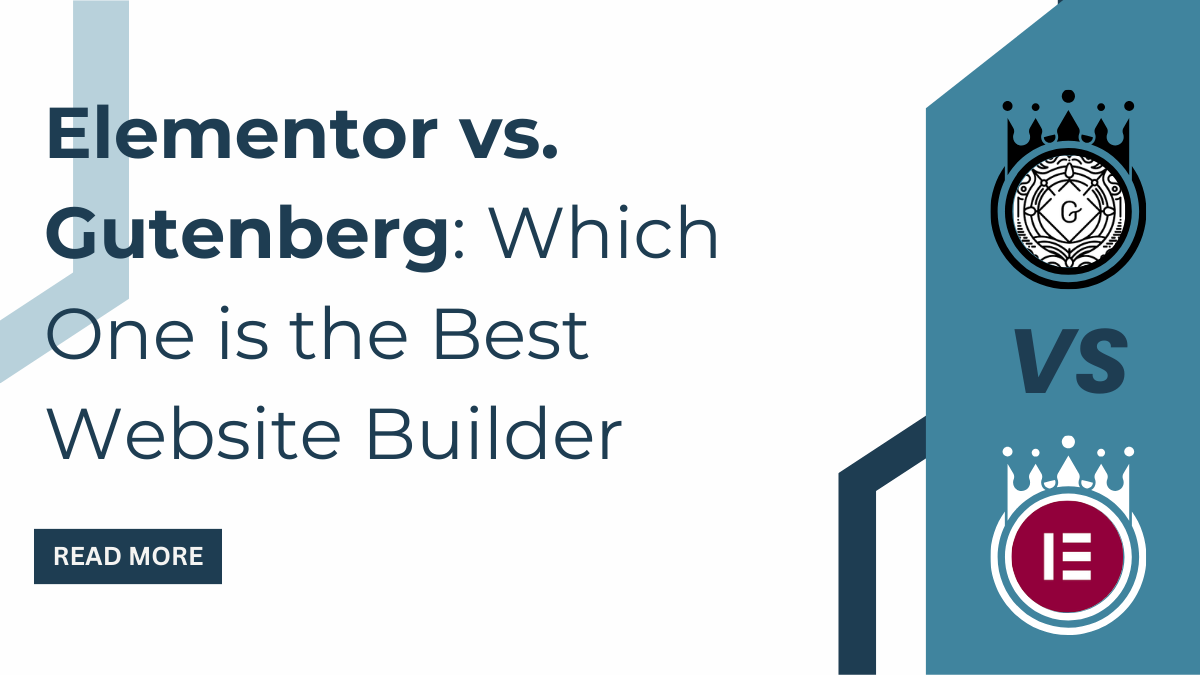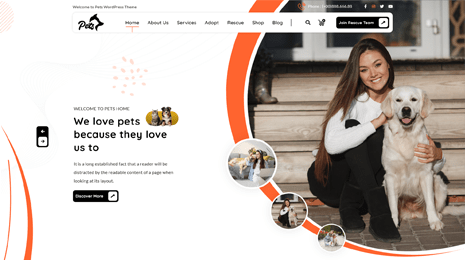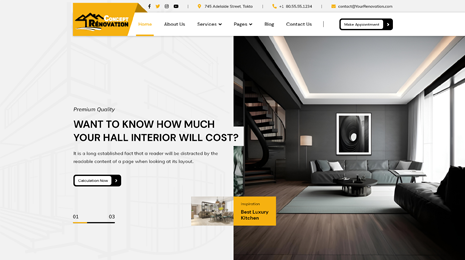Are you baffled between Elementor vs. Gutenberg for your niche website design? There is no need to bite your nails for this and create a mess. We are here to make your choice between Elementor and Gutenberg easier.
If you are unaware of Gutenberg, then let me bring to your attention that it is the native WordPress editor. It brings up your niche website using complex designs and unique features to add. It is completely free of charge and can be extended using the plugin Otter Blocks. On the other hand, Elementor is a website-building plugin, that provides absolute flexibility to custom-design a website.
There is a lot of confusion about what to choose for your website. But in this blog, you will find the right answer at the end. Stay gripped.
What is Elementor?

The most renowned page builder that comes to mind when talking about building a website is Elementor. Most of them know about it, and for those with no knowledge, Elementor is the page builder plugin for WordPress.
Curating your website design with Elementor is by far the most settled decision you can make. Creating visually attractive websites with zero codes is its true definition. It grips your website using the most attractive and unique designs you will ever come across. This is what Elementor is; even beginners with zero coding skills can test their creativity by building websites. One of the biggest reasons why Elementor has millions of active users is its drag-and-drop facility. This is the simplest way you can build innovative websites in no time. Even there is a live preview option where you can see how the customization looks. It comes in both free and paid versions. The basic version itself is a wholesome pack of outstanding features to deal with. To access the entire plugin, you can extend its functionality to the paid version.
Checkout our best elementor WordPress themes listed in our previous blog. This list will make it easier for you to choose best theme for you.
Here are some of its uses you must know:
- Elementor is a completely user-friendly plugin, even for novices.
- Hundreds of pre-designed templates are there, holding almost every type of niche website you are looking for.
- Custom widgets are provided to make your site look sophisticated and easy to navigate.
- The drag-and-drop facility makes it more appealing.
- Customisation is allowed, ensuring every user has their own unique and desired piece of content on the content on the website.
What is Gutenberg?

Unlike Elementor, most of the users are still unaware of Gutenberg and its contribution to WordPress. You already know that earlier, WordPress used the classic editor as its default editor. Then came the Gutenberg block editor in 2018, with the concept of adding blocks instead of using features directly.
And now, WordPress has made its existence the default editor. The only motive for using Gutenberg is its ease of use, which helps in building complex websites easily. Even users with less technical skills can make up their niche websites using blocks and the drag-and-drop facility. Placing blocks instead of directly using the features is the modern way to create innovative websites. Using the drag-and-drop facility, blocks can be further customized as required by the user. You can explore blocks for almost every function, like tables, images, headings, and more.
Checkout our best Gutenberg themes by VW Themes. These themes are designed using Gutenberg editor. They have sleek design and functionality to create a website with ease and hassle free.
And here are some powerful things you must know about Gutenberg:
- Gutenberg is known for its ease of use, so a novice can build websites without any technical skills.
- Drag-and-drop facilities are allowed to directly place the blocks at desired locations.
- A large number of blocks are placed in a single place so that users can easily explore them.
- It is the default WordPress editor, so it requires no cost to build websites.
- You will find a sleek range of premade templates that can blend with your niche easily.
- Customization is allowed to bring out the best of your website without any codes.
- It even works with other themes and plugins, being the native WordPress editor.
Key Prospects to Compare Between Elementor and Gutenberg
After knowing what Elementor and Gutenberg are, along with their respective key features, let’s enter the main battle. I mean, we will properly compare all the key prospects, which will let you know which is better.
1. Ease of use: Elementor vs. Gutenberg
The first factor that affects the overall presence of your site is its ease of use. We will see how Elementor and Gutenberg are compared to user-friendly websites.
Gutenberg is the default editor in WordPress, so the compatibility issue has already faded. It is meant to be so easy, honey, that even newcomers wouldn’t hesitate to use it. With that said Gutenberg easily blends with whichever theme or plugins you are using on your site. It will come out as a powerful thing to maintain on your site. Plus, the interface is super easy to handle without a separate admin panel. Your WordPress website’s dashboard itself is the way to connect with the Gutenberg editor.
On the other hand, Elementor is a plugin that has a different setup and configuration to handle. You need to install it, and then a separate admin space is given for users to handle. Since Elementor is not native to WordPress, there is a slight learning curve that developers can easily handle.
Elementor is an intuitive plugin by nature, so it’s not that difficult to learn. However, when it comes to comparing the ease of use between Elementor and Gutenberg, clearly Gutenberg wins.
2. Compatibility with other themes and plugins: Elementor vs. Gutenberg
Another factor is to look at whether Gutenberg and Elementor blend with your WordPress themes and plugins. Let’s take a quick face-off.
You know very well about Gutenberg, the native editor of WordPress. That means the entire infrastructure of WordPress is integrated with Gutenberg. So, the basic nature gives automatic compatibility to themes and plugins with Gutenberg. If the themes and plugins aren’t compatible with Gutenberg, you need to upgrade them. It is always necessary to use themes and plugins that are updated, and the plugins are technically secured.
On the other hand, Elementor is a page builder plugin that is compatible with most WordPress themes and plugins. With that said, your website must be running on the newest versions to support compatibility. Your WordPress site must have versions of 5.9 and 7.4 for PHP. If your site is running on older versions, it can create issues.
So, another victory goes into Gutenberg’s bag.
3. Performance and Speed: Elementor vs. Gutenberg
The most vital fact that you can’t miss when choosing between a page builder plugin and the editor. Let’s see how Gutenberg and Elementor differ when it comes to the performance and speed of your website.
Website speed is one of the factors that affect the performance of your entire site. Gutenberg, being the native WordPress element, keeps your site’s speed to greater levels. You will notice a faster loading website with Gutenberg. Also, it holds fewer additional elements that can create a mess and affect the speed of your site.
Elementor, on the other hand, can influence high speeds when integrated with your site. But it needs to be handled professionally, with additional features to add. All-in-all, it is observed that Gutenberg exceeds Elementor when it comes to speed and performance orientation.
So, again, Gutenberg wins the speed and performance factor.
4. Design and User Experience: Elementor vs. Gutenberg
The design and user experience part is another critical part that needs to likely be well figured out. Your website’s design must be clear, intuitive, and easily accessible. Websites with complicated designs confuse users and poorly impact the user experience. And those with clean interfaces make users stay on your site and boost the user experience. Now let’s see how Elementor and Gutenberg perform when it comes to design and experience.
You know very well that Gutenberg is the native WordPress editor, so no doubt exists about the design. Additionally, it works on the WYSIWYG (What you see is what you get) rule. This is something very impressive and loved by most beginners with zero coding skills. While editing, what the users are watching is the same after publishing. This makes users believe more in using Gutenberg, and that too using the drag-and-drop facility.
Elementor also makes editing simpler by using the drag-and-drop facility.
5. Customizability: Elementor vs. Gutenberg
The most wanted feature that every website designer looks for while designing a website. The design options must be willing to provide custom options, enabling users to create their desired websites. This is where actual testing is applied to determine whether the web design assets are flexible and easy to customize. The more you use flexible design options, the more unique your site will be. So, let’s watch out how Elementor and Gutenberg react when it comes to customization.
Gutenberg, being attached to WordPress, has limited scope for providing custom features. Still, it gives you a full-site editing offer that comes with block-based themes. It holds compatible themes that allow users to fully customize the theme options, header, footer, and more. But you cannot exceed the limit of having custom options with Gutenberg.
While Elementor, the powerful page builder, owns 300+ design templates for almost every niche industry, Getting a personalized and unique website is a thing of the past with Elementor. Users just need to pick one template for a particular niche, tweak the settings, and it’s ready. To customize the templates, you just need to pick the element from the sidebar and place it. Its customizing features can be easily extended to advanced levels without much hassle. Also, the response is fast, and users with zero coding skills can perform web design easily.
So, here, Elementor wins when it comes to customizability.
6. Responsiveness: Elementor vs. Gutenberg
Responsiveness is another vital element that a modern website must have in its interface. A website with a responsive design makes it look great on whichever screen size users have. Your website must look great, covering every screen size without any lag. A responsive website eventually attracts more traffic to your website. People prefer to stay more on their mobile phones than on desktops. So, we will watch out for whether Elementor and Gutenberg are responsive or not.
There’s good news: both Elementor and Gutenberg are responsive. There is no comparison between Elementor and Gutenberg in terms of responsive design. Whether you choose Elementor or Gutenberg, you will find your website looks great on every screen.
But when you are going with Gutenberg, you need to know something about it. Gutenberg is the default WordPress editor, so it works with any theme you choose. But make sure the theme you choose is responsive enough to make your site look fully responsive. If you have chosen a non-responsive theme, no wonder your website will match the screen size.
7. Pricing: Elementor vs. Gutenberg
Then comes the pricing part, when you must look at your budget while designing a website. You must have a clear budget for designing your site. Let’s see if Gutenberg and Elementor match your budget.
Gutenberg, being the native WordPress editor, is completely free of charge and requires no developer charges either.
While Elementor has both free and paid versions to use, the free version itself is a wholesome collection of powerful features to use. The free version is enough in most cases, as it comes with a packed range of creative features. But if you wish to have full access to the plugin, you need the paid version. You need to choose from four different plans with Elementor, ranging in the number of websites to add.
The plan starts at $59 annually with access to a single website. Next is the advanced plan with 3 websites for $99 annually. The expert plan provides access to 25 pro websites for $199 annually. And lastly, the agency plan with 1000 pro websites for $399 annually.
8. Customer Support: Elementor vs. Gutenberg
When talking about customer support, which is again a pivotal asset that keeps your site popular among users, professional customer support makes your site more powerful and boosts credibility. Poor customer support can reduce the number of potential clients on your site. So, now we have to see the customer support for Elementor and Gutenberg.
When talking about Gutenberg and its customer support, then again, the fact clashes that it is the native WordPress editor. So, Gutenberg does not hold a direct support forum. Instead, users can go to the WordPress.com support community and ask about Gutenberg queries.
For Elementor, the free version has a good user forum that provides customer support. To get more features like real-time chats and email support for Elementor, you need to have the premium version.
Which one is the best: Elementor vs. Gutenberg?
Choosing which page builder weighs more on your website is crucial. However, you need to make the right decision to build your website. Getting the perfect criteria can help you choose the right page builder. Here are the right criteria to help choose between Elementor and Gutenberg:
Make sure you know the right skills that both Elementor and Gutenberg possess in their key features. Both of them are skilled in their respective ways, but that one per cent difference can make your decision firm.
A budget matters when you are stepping into the web world. Look for the free page builder, which is Gutenberg, native to WordPress. Customization is another factor that matters when you opt for completely customized websites. Looking for a wide variety of design options can even help in selecting the right page builder.
Conclusion
There is a wrap to knowing which is better: Elementor vs. Gutenberg. Both of them are the most powerful assets when building a website. You need to know how they are different from each other and useful in their own company. Gutenberg is the native WordPress editor that replaced the classic editor. While Elementor is a complete page builder plugin with a packed version of web design assets to use. Both of them have a taste for designing websites innovatively with the best features to apply. And not to worry, we have made a complete guide to knowing everything about them. Also, we have made a list of key features that you will understand to make your decision firm.
However, regardless of which builder you choose, integrating a WordPress theme bundle can further enhance your website-building journey by providing a comprehensive set of design tools and resources to create stunning and functional websites tailored to your business needs. Ultimately, the decision between Elementor and Gutenberg boils down to individual preferences, project requirements, and desired levels of customization and flexibility.













